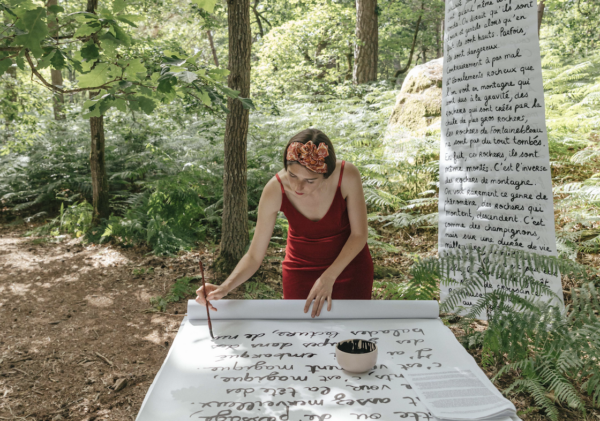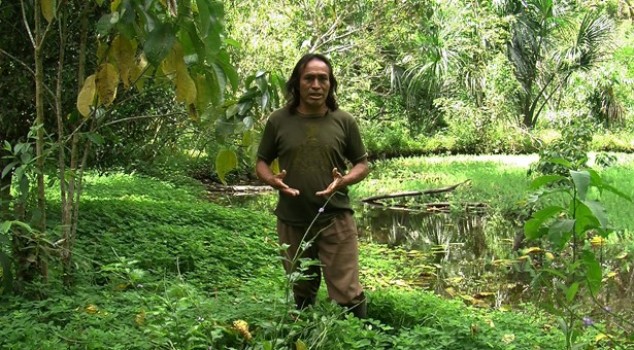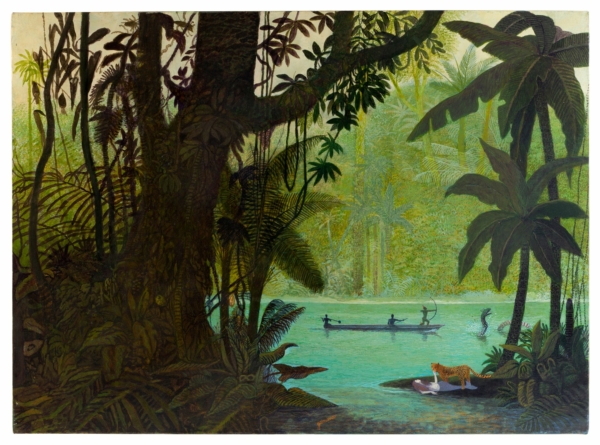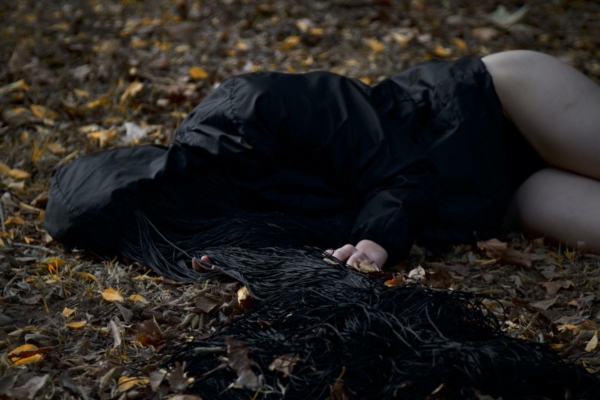
Appel à résidences – les Nuits des Forêts 2026
En 2026, le festival Nuits des Forêts invite les artistes à prêter l’oreille au vivant. À travers un appel à…

Crédit image : Ursula Biemman and Paolo Tavares, Forest Law, 2014 © The artists
Artists : Eduardo Abaroa, Ala Plástica, Darren Almond, Marcos Avila Forero, Amy Balkin, Subhankar Banerjee, Mabe Bethônico, Ursula Biemann & Paulo Tavares, Center for Land Use Interpretation, Minerva Cuevas, Jimmie Durham, Harun Farocki, GIAP: Grupo de Investigación en Arte y Política (with Beatriz Aurora), Paulo Nazareth, The Otolith Group, Fernando Palma Rodríguez, Claire Pentecost, Abel Rodríguez, Miguel Angel Rojas, Walter Solón Romero
Facing catastrophic climate change and environmental destruction, modern society appears locked in crisis. That crisis, at once ecological, economic, political, and cultural, concerns our fraught relationship to the world around us—including the myriad life forms threatened with extinction, biodiverse habitats befouled by the fossil fuel industry, and the planet’s atmosphere filled with greenhouse gas emissions—which is putting life as we know it at grave risk. In recent years, viewing Earth as an infinite supply of natural resources to be freely exploited by multinational corporate capitalism has, however, been increasingly challenged, and today, the rights of nature to subsist in a state free from destructive human practices are increasingly being recognized in environmental law as a means to save our fragile existence.
While such a legal transformation is global in scope, there has been an intensity of interrelated legal, political, and cultural developments in the Americas—from the Southern Andes to the Arctic Circle—that link indigenous movements, political activists, ecologically concerned artists, and legal and philosophical theories. From Bolivia’s and Ecuador’s recent enshrining of the rights of Mother Earth in their constitutions and legal systems, to the international indigenous movement Idle No More that has joined First Nations peoples across the continent via environmental activism, each has contributed in significant ways to this bi-continental shift, a shift that has also been mirrored in recent philosophical developments (such as new materialism, speculative realism, object-oriented ontology and new waves of eco-feminism) in rethinking humanity’s relation to non-human life. Each of these diverse movements has variously contested the anthropocentrism of instrumental reason of the assumed human sovereignty over the environment (a political philosophy that has determined the hemisphere’s long history of colonialism, neo-colonialism and neo-liberalism), demanding a newly egalitarian way of being-in-the-world, of seeing humans and ecology as inextricably intertwined, of endowing non-human objects and life forms with agency and legal standing. The outcome is nothing less than a cultural-political-philosophical revolution that is redefining our relation to the world, even if the enforcement and implementation of bio-centric legality remains an ongoing challenge.
With this research-exhibition, we aim to explore how an international grouping of artists and activists—all with links to the Americas—have participated in this transformation in their diverse practices and conceptual engagements. How have they considered these questions, advanced their own analyses, and produced creative modelings that express the fundamental principles of rights that transcend human subjects? In refusing to surrender the term « nature, » as is proposed in the post-natural discourse of recent ecocritical theory, Rights of Nature traces the cultural resonances of eco-centric legal developments, Amerindian cosmologies referring to Pachamama (Quechua and Aymara for « Mother Earth »), and speculative object-oriented philosophy—not in order to retain the outdated concept of a pure realm apart from the human, but rather to register a new conception of nature located within indigenous rights struggle, Earth law, and political ecology. The exhibition considers how a diverse set of practitioners have imagined or attempted to realize what Naomi Klein, in her recent book This Changes Everything, has described as a world we want to live in, where « we » is no longer limited to an exceptional and autonomous humanity.
Curated by TJ Demos and Alex Farquharson with Irene Aristizábal
Changes Everything
24 January – 25 March 2015
Nottingham Contemporary
Weekday Cross
Nottingham NG1 2GB
www.nottinghamcontemporary.org
En 2026, le festival Nuits des Forêts invite les artistes à prêter l’oreille au vivant. À travers un appel à…
le Center for Art, Research and Alliances (CARA) à New York présente The Earth, the Fire, the Water, and the…
Et si la frontière entre l’humain et le non-humain n’était qu’une construction fictionnelle — et si ces fictions pouvaient être…

